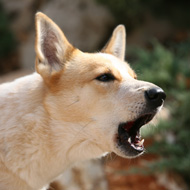Dogs Registration Bill to have second reading

Income raised from registration would be used for dog welfare and the prevention of dog attacks.
The Dogs (Registration) Bill, put forward by MP Julie Hilling, is expected to have its second reading debate in Parliament today (January 9).
The Bill would require all dogs to be registered annually, with the intention that income raised from registration would fund the enforcement of conditions and penalties imposed on those who own dogs and fail to control them.
The Bill was introduced to Parliament in November 2014 under the Ten Minute Rule, which allows an MP to make his or her case for a new bill in a speech lasting up to ten minutes.
Bolton West MP Julie Hilling has led the campaign for tighter legislation on dangerous dogs since a fatal dog attack in her constituency.
If the Bill is passed, all dogs will have to be microchipped and dogs would have to be registered in an annual basis for a small fee - which would in turn be used for dog welfare and the prevention of dog attacks.
Whilst the RSPCA is in favour of dog licences or an annual registration fee, the Kennel Club has criticised the Bill, saying that it does not support the annual registration as a means of achieving enforcement.
In a statement, released yesterday (9 January), The Kennel Club said that they would prefer to see an overhaul of current dog control legislation, to update and consolidate existing laws to bring in more preventative measures to protect the public and dog welfare.
Caroline Kisko, Kennel Club Secretary, said: "Whilst dog attacks that cause fatalities are a tragedy, they are also very rare and we don't believe that knee-jerk legislation should be the response - it was this approach that led to the highly flawed and much-criticised Dangerous Dogs Act in the first place.
"In the vast majority of fatal dog attacks, which in themselves are extremely rare, the dog's owner is known to the victim, meaning that registration details would not be required to identify the owner anyway, so we do not believe that incidents of this type would be prevented in further this way."



 The Animal and Plant Health Agency (APHA) has updated its online reporting service for dead wild birds.
The Animal and Plant Health Agency (APHA) has updated its online reporting service for dead wild birds.